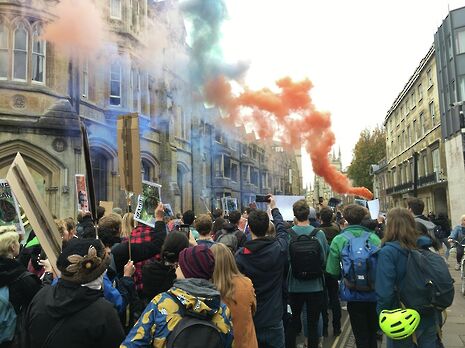Hundreds of protestors march through Cambridge in climate change rally
The march follows Zero Carbon’s report last week detailing the University’s close ties with fossil fuel giants

On Monday, over 200 protestors gathered at a mass rally organised by Cambridge Zero Carbon to protest Cambridge University’s links with fossil fuel companies.
This follows from a report released last week by Cambridge Zero Carbon Society, which details the ways in which the University “legitimises and provides practical support to the fossil fuel industry.”
Several groups of protestors took to the streets of Cambridge for over an hour carrying banners, signs and brightly coloured flares. According to a Cambridge Zero Carbon Society head count, there were over 200 people showing up in support, including staff and members of the public.
Other societies and groups, such as Cambridge Defend Education and the UCU also showed up with banners in support.
CUSU President, Edward Parker Humphries gave a speech in support of the rally: “When we are faced with a crisis of such magnitude and urgency our response must be radical and immediate, yet the pace of change at this University can often be excruciating slow”
The crowd appeared energetic and hopeful, holding up banners and signs with slogans, such as “The report is out, now fossil fuels out” and, “In case of climate emergency, break the ruling class.” A large, white banner was at one point draped across the front of the Senate House with “Cambridge Come Clean” in bold, black letters.
A few students with loudspeakers led the group to exclaim chants such as “I believe that we will win”, “We won’t let our climate die” and “Hey, ho, fossil fuels have got to go”. Some could be seen dancing along to these chants, while others banged pots and pans.
The rally was partly spurred by some of the revelations made in the Cambridge Zero Carbon Society Report which revealed funding from fossil fuel companies exceeding £18 million since 2001. It also highlighted links between the 5 members of the University Finance Committee and the fossil fuel industry, and fossil fuel companies sponsoring professorships, events and awards.
In addition, Varsity revealed last Friday that the University had removed online links to CASP, a research group funded by oil and gas companies.
“I’ve been calling on the University to divest, pretty much constantly; the University has done nothing,” said Beth Bhargava, a third-year undergraduate and senior Zero Carbon member, who went on hunger strike last year to support divestment.
Citing this summer’s drought in Chennai, India and a young girl’s death in London recently linked to unlawfully high levels of air pollution, Bhargava called the University’s continued support of the industry as “a seal of approval on ecocide and on genocide, which is a tragedy and one which I don’t think anyone here today wants to be complicit in.”
The rally ended outside the Senate House with a speech by Ewan Hawkins, a student at King’s, where he led protestors to shout out every single one of the demands made by Cambridge Zero Carbon Society.
Some of the immediate requests that the protesters made to the University included refusing donations, research grants, sponsorships and advertising from fossil fuel companies. They also demand full divestment from fossil fuels and an end to all extractive research done by the University by 2021.
 News / Colleges charge different rents for the same Castle Street accommodation2 March 2026
News / Colleges charge different rents for the same Castle Street accommodation2 March 2026 News / King’s hosts open iftar for Ramadan3 March 2026
News / King’s hosts open iftar for Ramadan3 March 2026 Theatre / Lunatics and leisure centres 4 March 2026
Theatre / Lunatics and leisure centres 4 March 2026 News / Angela Merkel among Cambridge honorary degree nominees27 February 2026
News / Angela Merkel among Cambridge honorary degree nominees27 February 2026 News / News in Brief: waterworks, wine woes, and workplace wins 1 March 2026
News / News in Brief: waterworks, wine woes, and workplace wins 1 March 2026









